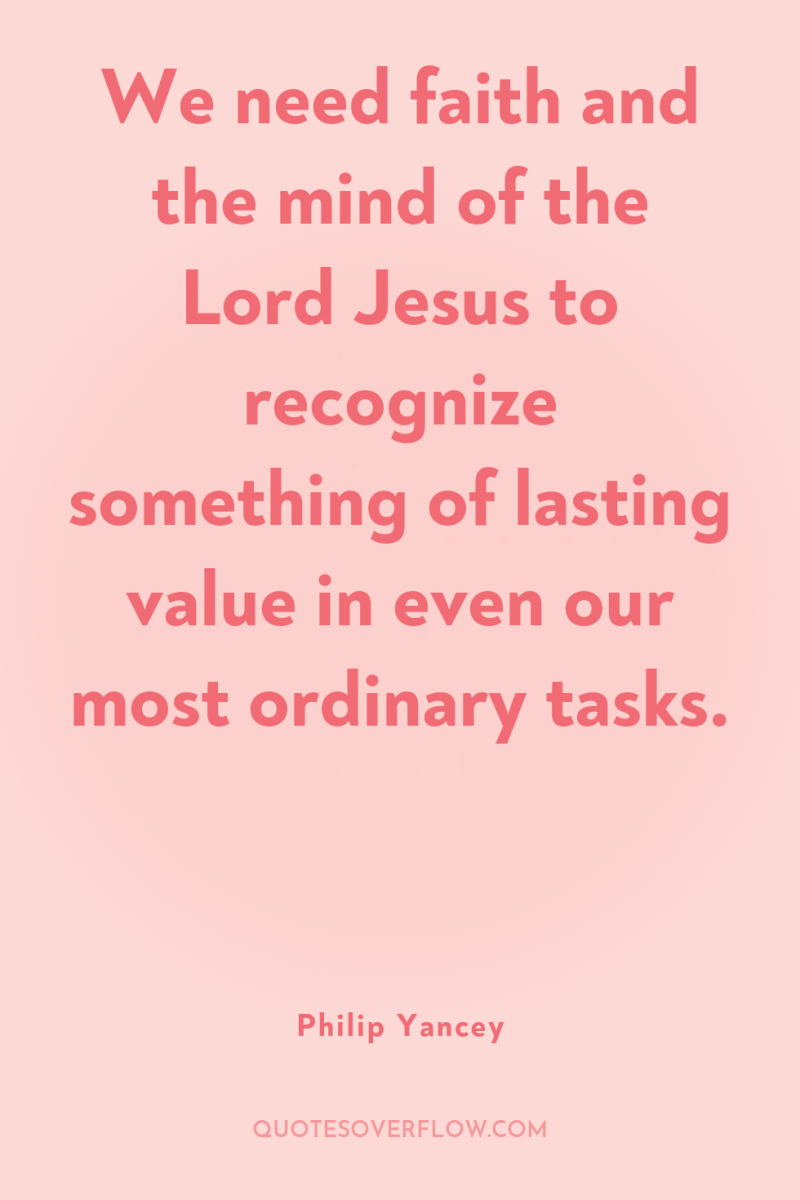
1
We need faith and the mind of the Lord Jesus to recognize something of lasting value in even our most ordinary tasks.Philip Yancey
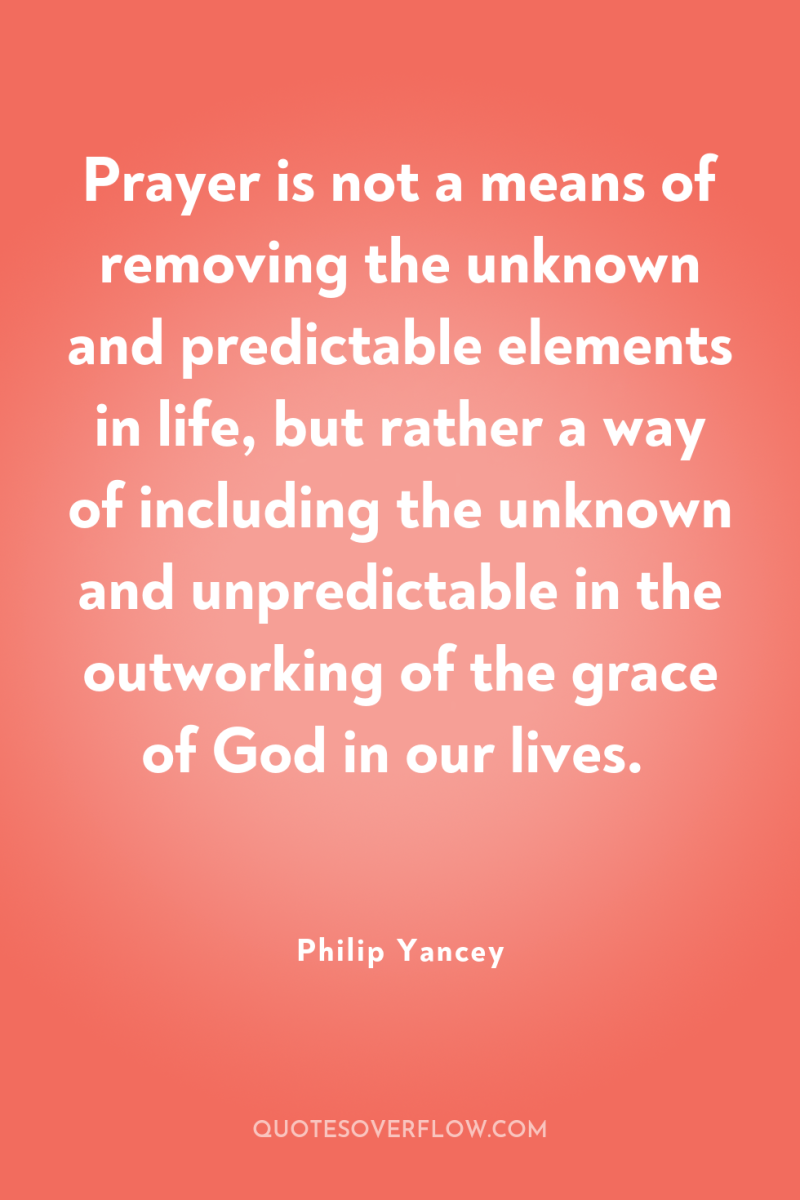
2
Prayer is not a means of removing the unknown and predictable elements in life, but rather a way of including the unknown and unpredictable in the outworking of the grace of God in our lives.Philip Yancey
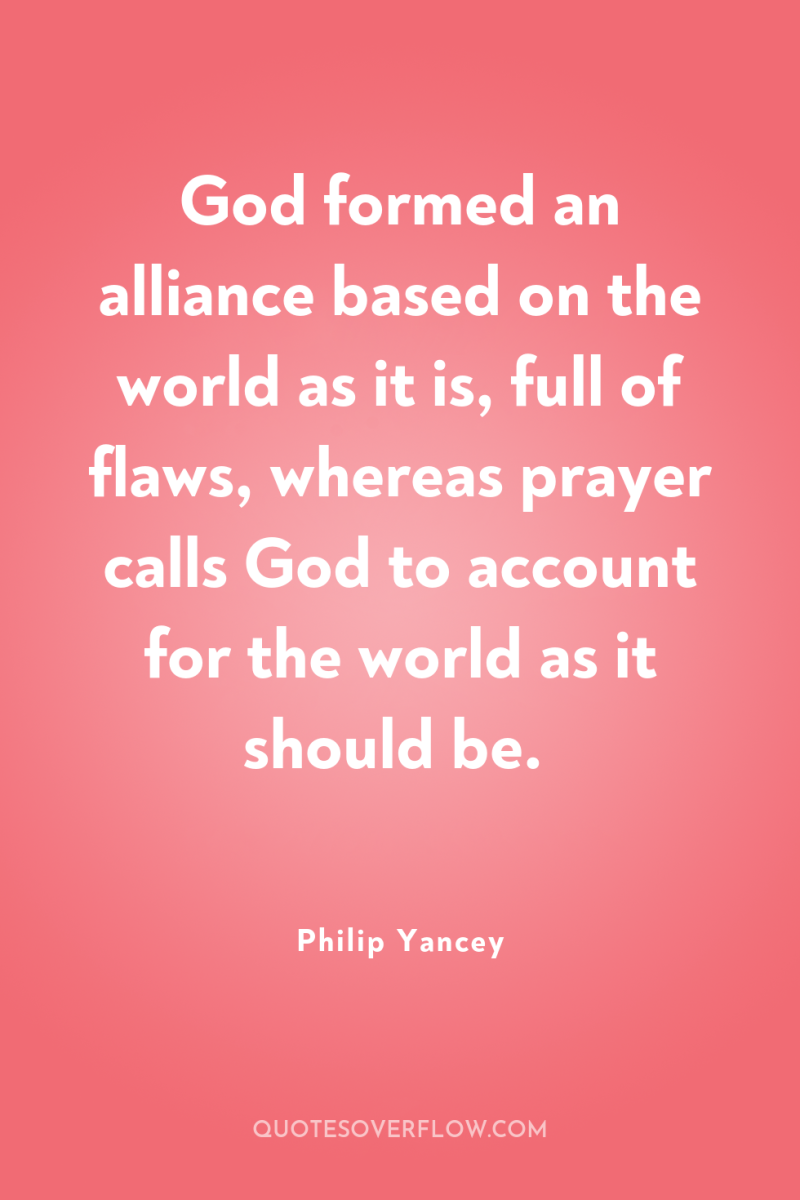
3
God formed an alliance based on the world as it is, full of flaws, whereas prayer calls God to account for the world as it should be.Philip Yancey
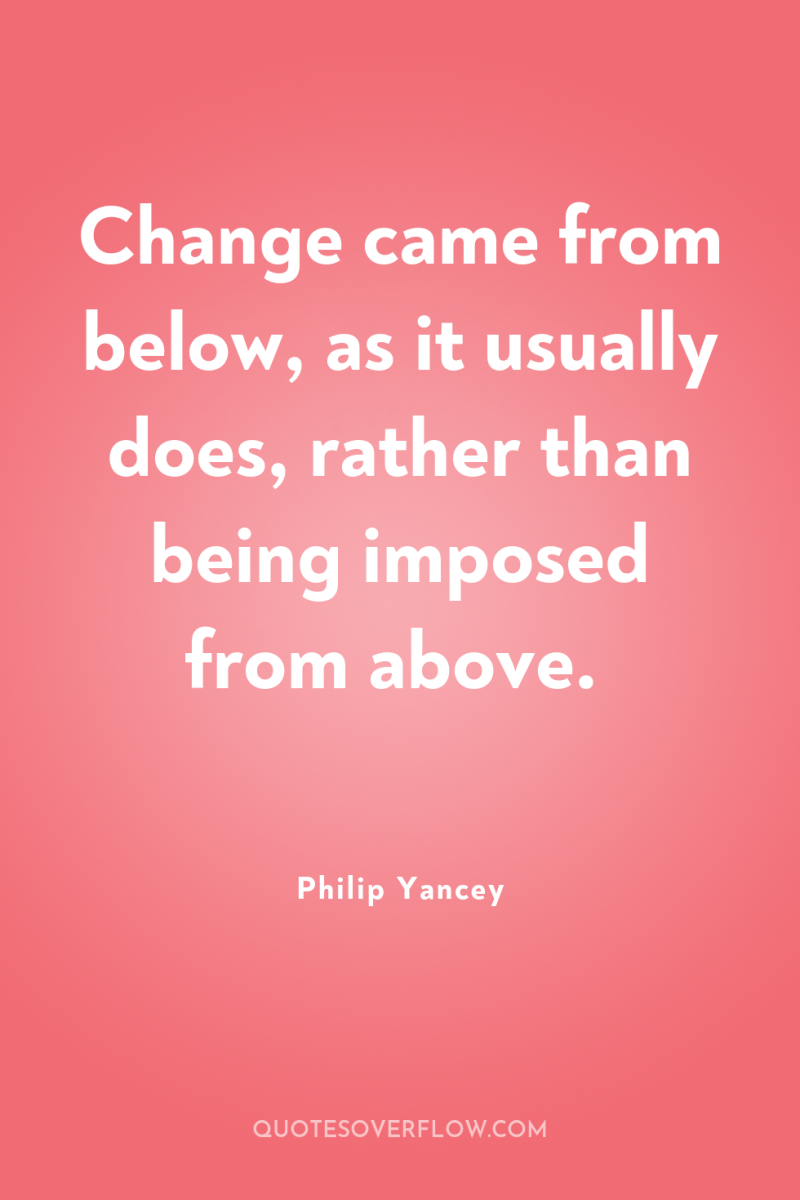
4
Change came from below, as it usually does, rather than being imposed from above.Philip Yancey
5
Power, no matter how well-intentioned, tends to cause suffering. Love, being vulnerable, absorbs it. In a point of convergence on a hill called Calvary, God renounced the one for the sake of the other.Philip Yancey
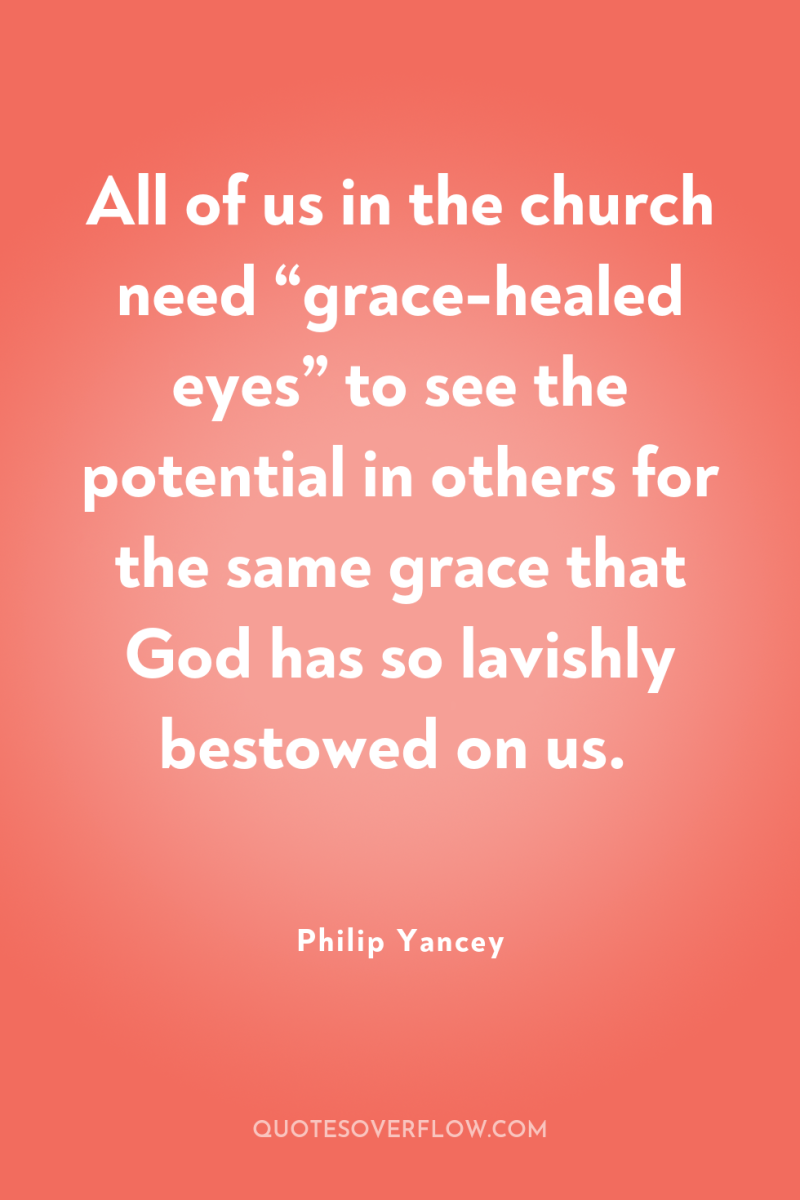
6
All of us in the church need “grace-healed eyes” to see the potential in others for the same grace that God has so lavishly bestowed on us.Philip Yancey
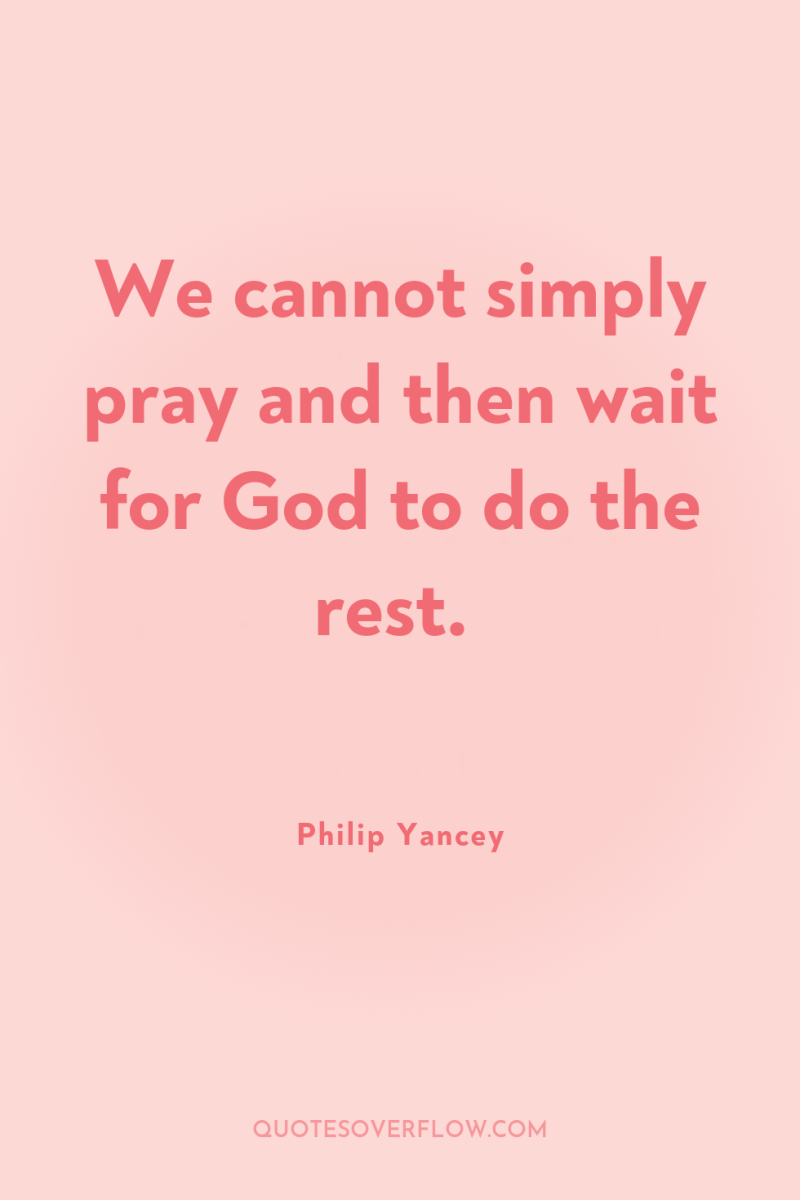
7
We cannot simply pray and then wait for God to do the rest.Philip Yancey
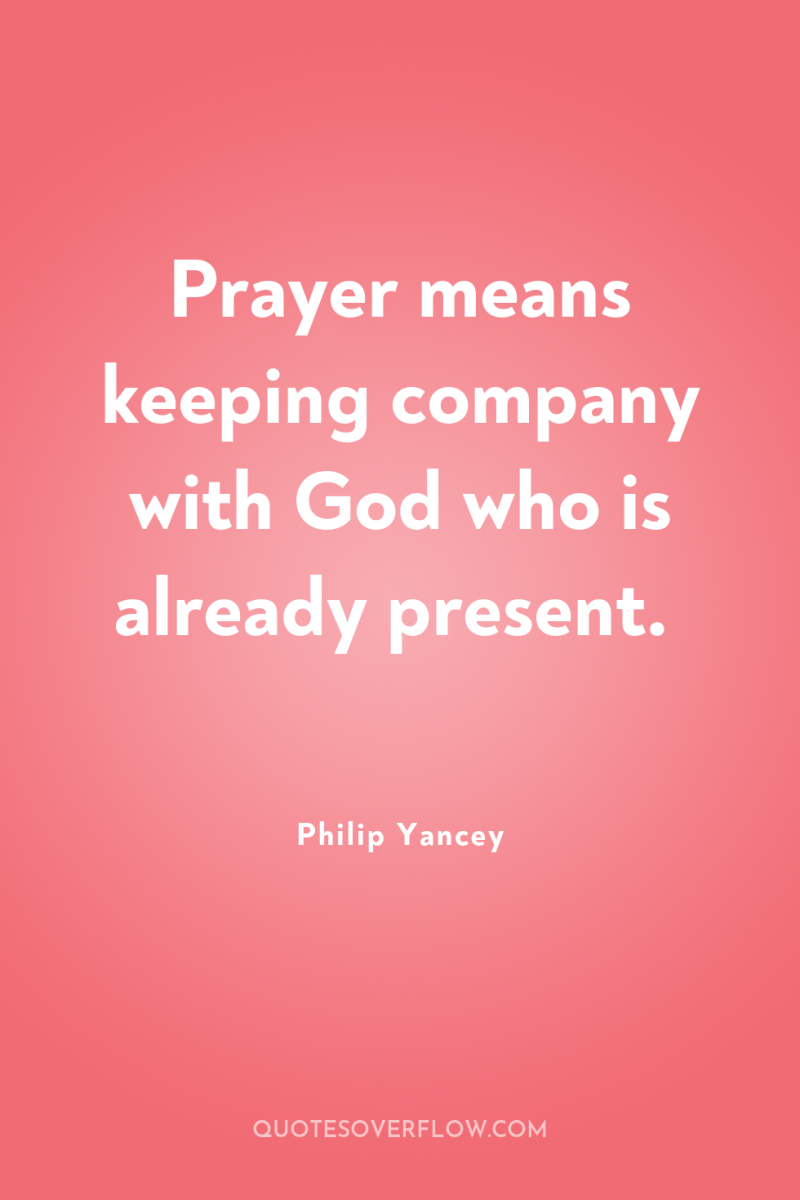
8
Prayer means keeping company with God who is already present.Philip Yancey
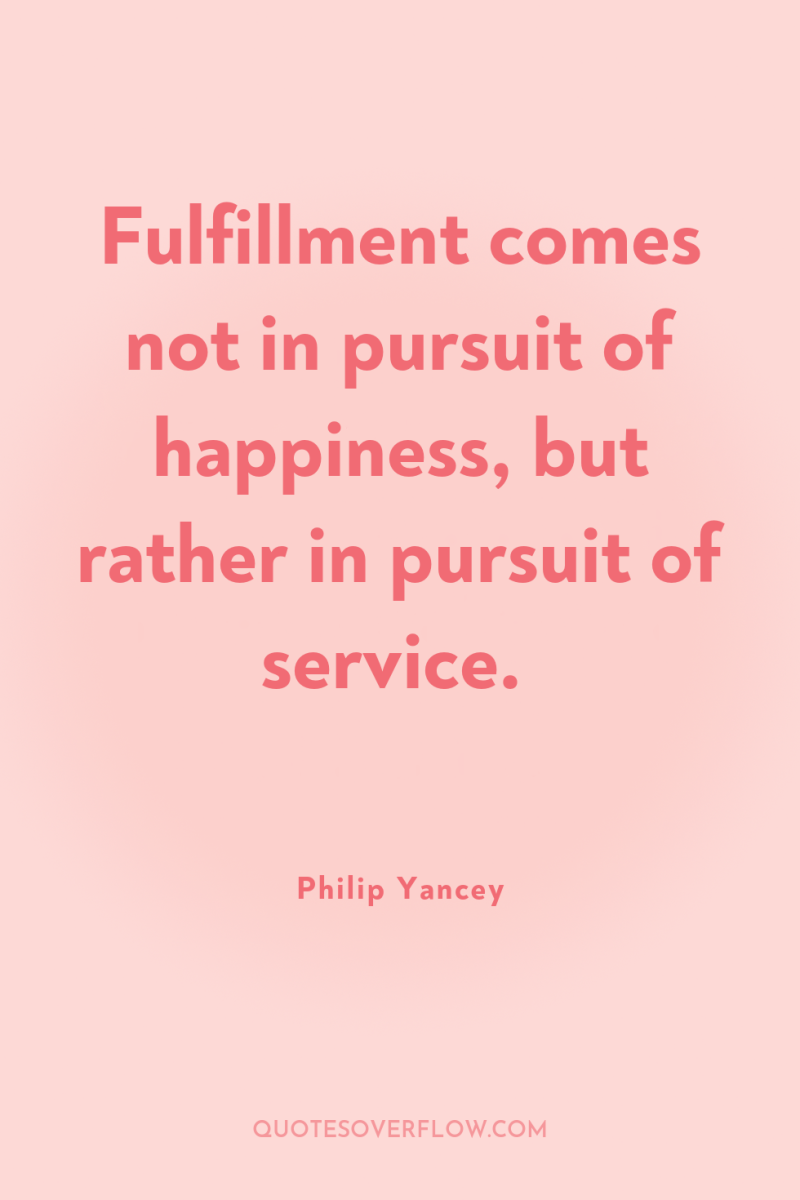
9
Fulfillment comes not in pursuit of happiness, but rather in pursuit of service.Philip Yancey
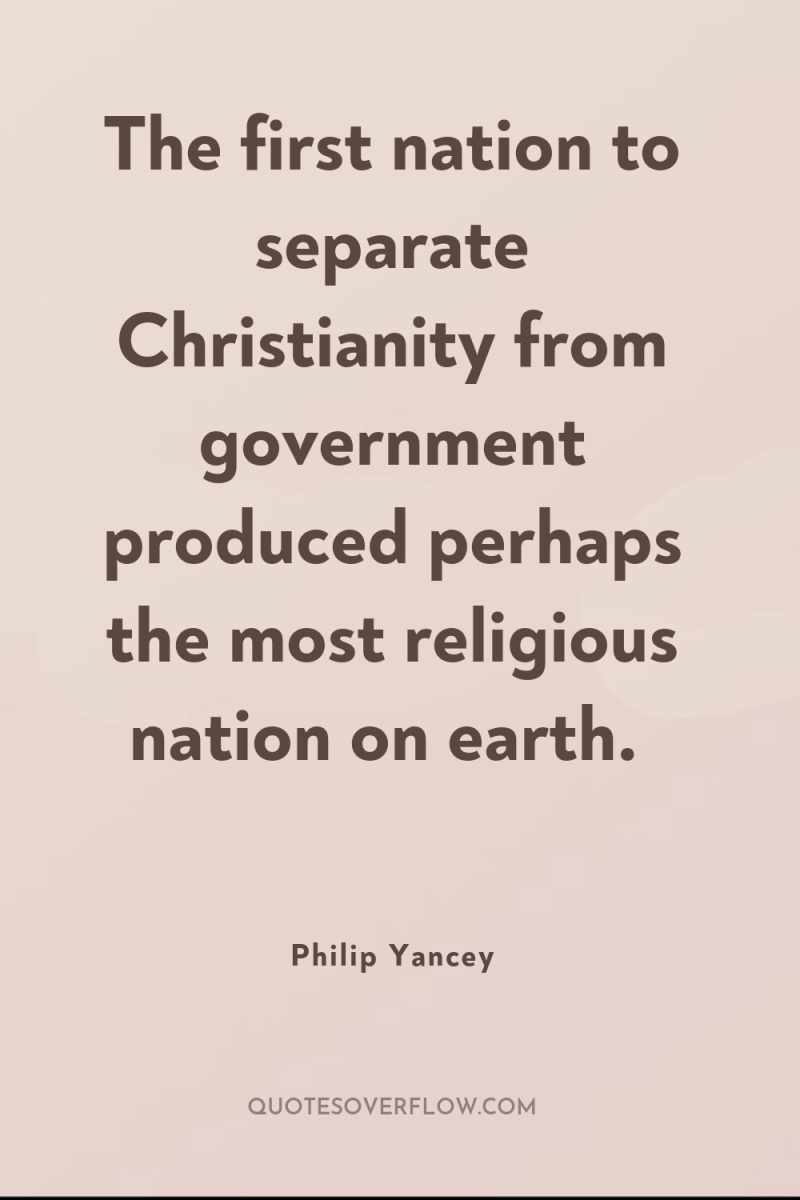
10
The first nation to separate Christianity from government produced perhaps the most religious nation on earth.Philip Yancey
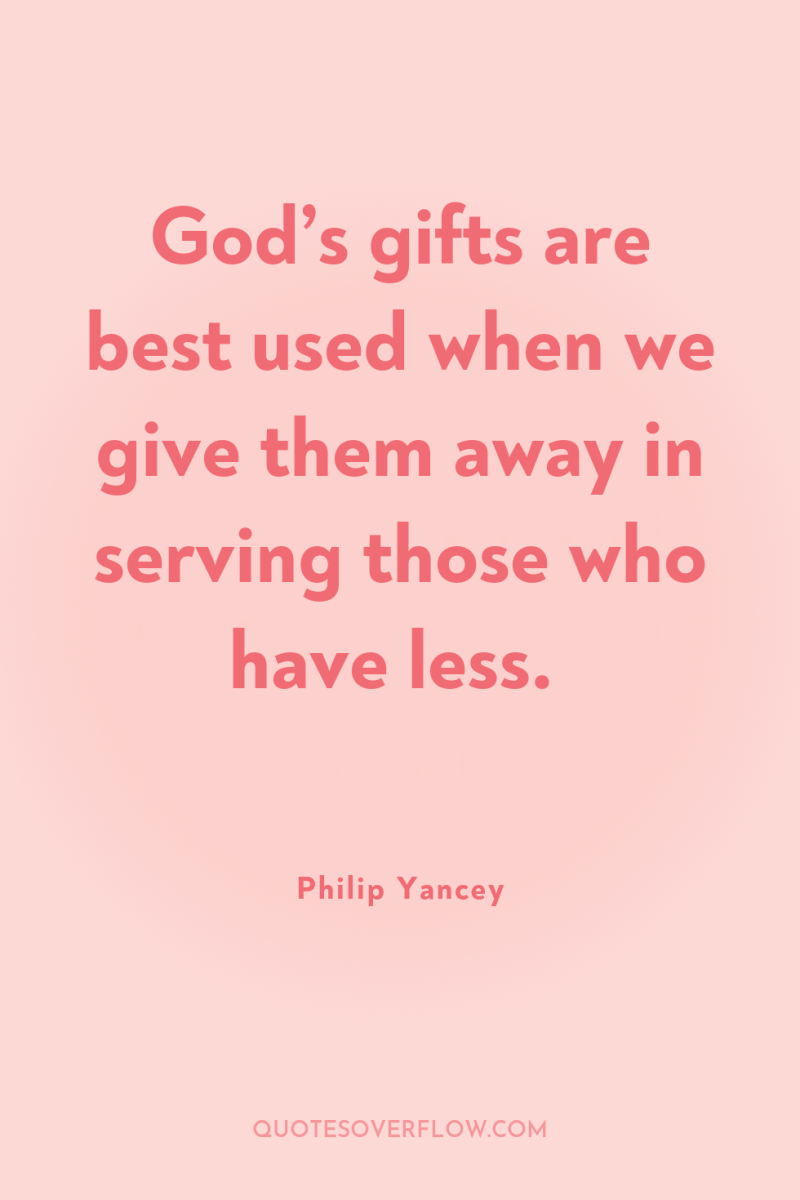
11
God’s gifts are best used when we give them away in serving those who have less.Philip Yancey
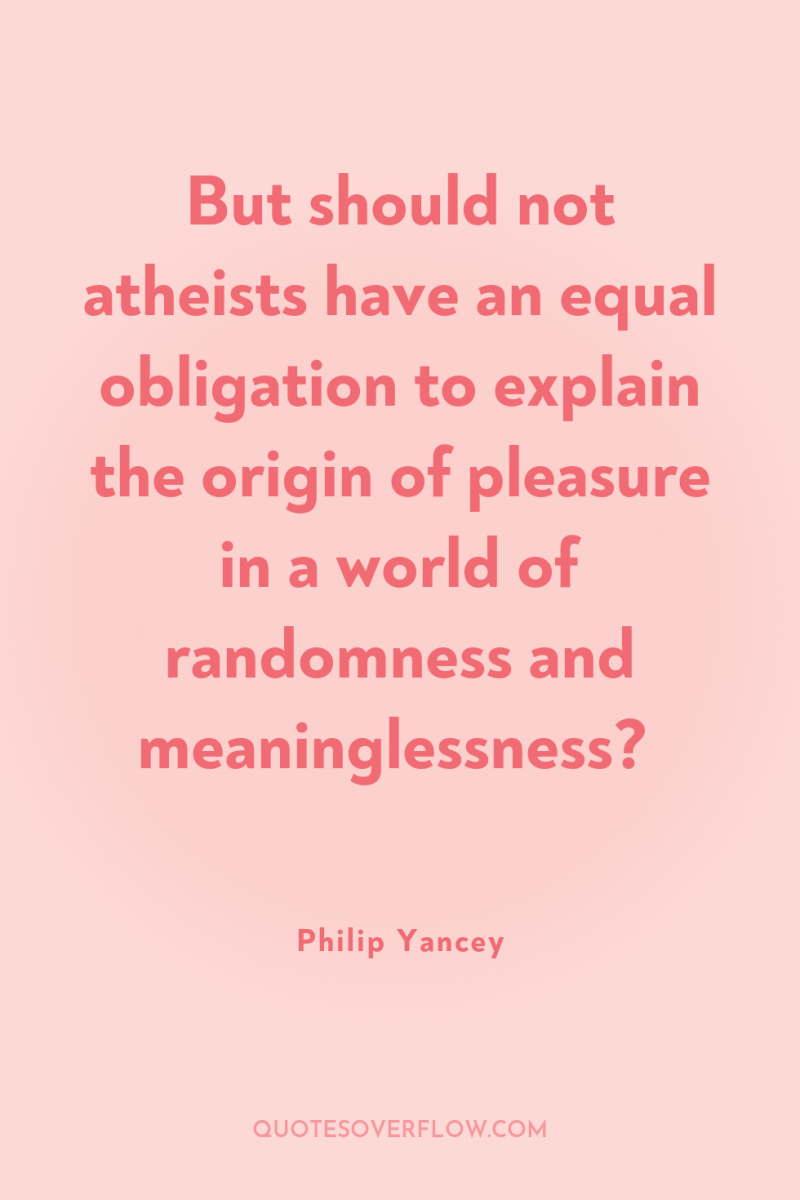
12
But should not atheists have an equal obligation to explain the origin of pleasure in a world of randomness and meaninglessness?Philip Yancey
13
To some, the image of a pale body glimmering on a dark night whispers of defeat. What good is a God who does not control his Son's suffering? But another sound can be heard: the shout of a God crying out to human beings, "I LOVE YOU." Love was compressed for all history in that lonely figure on the cross, who said that he could call down angels at any moment on a rescue mission, but chose not to - because of us. At Calvary, God accepted his own unbreakable terms of justice. Any discussion of how pain and suffering fit into God's scheme ultimately leads back to the cross. .Philip Yancey
14
As I look around on Sunday morning at the people populating the pews, I see the risk that God has assumed. For whatever reason, God now reveals himself in the world not through a pillar of smoke and fire, not even through the physical body of his Son in Galilee, but through the mongrel collection that comprises my local church and every other such gathering in God’s name. (p. 68, Church: Why Bother?).Philip Yancey
15
Where is God when it hurts? We know one answer because God came to earth and showed us. You need only follow Jesus around and note how he responded to the tragedies of his day: large-scale tragedies such as an act of government terrorism in the temple or a tower collapsing on eighteen innocent bystanders; as well as small tragedies, such as a widow who has lost her only son or even a Roman soldier whose servant has fallen ill. At moments like these Jesus never delivered sermons about judgment or the need to accept God’s mysterious providence. Instead he responded with compassion — a word from Latin which simply means, “to suffer with” — and comfort and healings. God stands on the side of those who suffer. (pp.27-28/What Good Is God?) .Philip Yancey
16
God reproduces and lives out His image in millions of ordinary people like us. It is a supreme mystery. We are called to bear that image as a Body because any one of us taken individually would present an incomplete image, one partly false and always distorted, like a single glass chip hacked from a mirror. But collectively, in all our diversity, we can come together as a community of believers to restore the image of God in the world. (In His Image, Philip Yancey and Dr. Paul Brand, p. 40).Philip Yancey
17
When I pray for another person, I am praying for God to open my eyes so that I can see that person as God does, and then enter into the stream of love that God already directs toward that person.Philip Yancey
18
If prayer stands as the place where God and human beings meet, then I must learn about prayer. Most of my struggles in the Christian life circle around the same two themes: why God doesn't act the way we want God to, and why I don't act the way God wants me to. Prayer is the precise point where those themes converge.Philip Yancey
19
…I interviewed ordinary people about prayer. Typically, the results went like this: Is Prayer important to you? Oh, yes. How often to you pray? Every day. Approximately how long? Five minutes — well, maybe seven. Do you sense the presence of God when you pray? Occasionally, not often. Many of those I talked to experienced prayer more as a burden than as a pleasure. They regarded it as important, even paramount, and felt guilty about their failure, blaming themselves. Does this sound familiar? (pp. 14/Prayer: Does It Make Any Difference?) .Philip Yancey
20
As the books of Job, Jeremiah, and Habakkuk clearly show, God has a high threshold of tolerance for what appropriate to say in a prayer. God can "handle" my unsuppressed rage. I may well find that my vindictive feelings need God's correction - but only by taking those feelings to God will I have the opportunity for correction and healing.Philip Yancey
21
The things, good Lord, that we pray for, give us the grace to labour for’, as Sir Thomas More expressed it. The inner voice of prayer expresses itself naturally in action, just as the inner voice of my brain guides all my bodily actions.Philip Yancey
22
The essence of Christian faith has come to us in story form, the story of a God who will go to any lengths to get his family back. The Bible tells of flawed people -- people just like me -- who make shockingly bad choices and yet still find themselves pursued by God. As they receive grace and forgiveness, naturally they want to give it to others, and a thread of hope and transformation weaves its way throughout the Bible's accounts.Philip Yancey
23
No one who meets Jesus ever stays the same.Philip Yancey
24
Whatever you may believe about it, the birth of Jesus was so important that it split history into two parts. Everything that has ever happened on this planet falls into a category of before Christ or after Christ.Philip Yancey
25
Often a work of God comes with two edges, great joy and great pain, and in that matter-of-fact response Mary embraced both. She was the first person to accept Jesus on His own terms, regardless of the personal cost.Philip Yancey
26
It seems that God arranged the most humiliating circumstances possible for His entrance, as if to avoid any charge of favoritism.Philip Yancey
27
Followers of Jesus stake their claim on the firm belief that God will one day heal the planet of pain and death. Until that day arrives, the case against God must rely on incomplete evidence. We cannot really reconcile our pain-wracked world with a loving God because what we experience now is not the same as what God intends. Jesus himself prayed that God's will "be done, on earth as it is in heaven, " a prayer that will not be fully answered until evil and suffering are finally defeated. .Philip Yancey
28
On a trip to Russia I bought one of those Matryoshka “nested dolls” that break apart at the waist to reveal smaller and smaller dolls inside…it occurred to me to me later that each of us, like the nested dolls, contains multiple selves, making us a mysterious combination of good and evil, wisdom and folly, reason and instinct… (pp.80)Philip Yancey
29
Thunderously, inarguably, the Sermon on the Mount proves that before God we all stand on level ground: murderers and temper-throwers, adulterers and lusters, thieves and coveters. We are all desperate, and that is in fact the only state appropriate to a human being who wants to know God. Having fallen from the absolute Ideal, we have nowhere to land but in the safety net of absolute grace.Philip Yancey
30
Jesus proclaimed unmistakably that God's law is so perfect and absolute that no one can achieve righteousness. Yet God's grace is so great that we do not have to.Philip Yancey
31
Only Christianity dares to make God's love unconditional.Philip Yancey
32
Grace is shockingly personal. As Henri Nouwen points out, 'God rejoices. Not because the problems of the world have been solved, not because all human pain and suffering have come to an end, nor because thousands of people have been converted and are now praising him for his goodness. No, God rejoices because one of his children who was lost has been found.Philip Yancey
33
God welcomes home anyone who will have him and, in fact, has made the first move already.Philip Yancey
34
Grace means there is nothing we can do to make God love us more... And grace means there is nothing we can do to make God love us less... Grace means that God already loves us as much as an infinite God can possibly love.Philip Yancey
35
Breaking the cycle of ungrace means taking the initiative.Philip Yancey
36
A cease-fire between human beings depends upon a cease-fire with God.Philip Yancey
37
We are all trophies of God’s grace, some more dramatically than others; Jesus came for the sick and not the well, for the sinner and not the righteous. He came to redeem and transform, to make all things new. May you go forth more committed than ever to nourish the souls who you touch, those tender lives who have sustained the enormous assaults of the universe. (pp.88)Philip Yancey
38
Misunderstanding must be nakedly exposed before true understanding can begin to flourish.Philip Yancey
39
We admit that we will never reach our ideal in this life, a distinctive the church claims that most other human institutions try to deny.Philip Yancey
40
Jesus gave us a model for the work of the church at the Last Supper. While his disciples kept proposing more organization ─ Hey, let's elect officers, establish hierarchy, set standards of professionalism ─ Jesus quietly picked up a towel and basin of water and began to wash their feet.Philip Yancey
41
Family is the one human institution we have no choice over. We get in simply by being born, and as a result we are involuntarily thrown together with a menagerie of strange and unlike people. Church calls for another step: to voluntarily choose to band together with a strange menagerie because of a common bond in Jesus Christ. I have found that such a community more resembles a family than any other human institution. Henri Nouwen once defined a community as “a place where the person you least want to live with always lives.” His definition applies equally to the group that gathers each Thanksgiving and the group that congregates each Sunday morning. (p. 64-65, Church: Why Bother?).Philip Yancey
42
Philip Yancey sees our blasé attitude toward the faithfulness of God in the waitstaff At Yellowstone. Even when they are finished their chores, they don't look up and marvel at the geiser going off. After all, they see it so often.Philip Yancey
43
Why the delay? Why does God let evil and pain so flagrantly exist, even thrive, on this planet?.. He holds back for our sakes. Re-creation involves us; we are, in fact, at the center of his plan..the motive behind all human history, is to develop us, not God. Our very existence announces to the powers in the universe that restoration is under way. Every act of faith by every one of the people of God is like the tolling of a bell, and a faith like Job's reverberates throughout the universe.Philip Yancey
44
Yet as I read the birth stories about Jesus I cannot help but conclude that though the world may be tilted toward the rich and powerful, God is tilted toward the underdog.Philip Yancey
45
And yet when I wish to explore how faith works, I usually sneak in by the back door of doubt, for I best learn about my own need for faith during its absence. God's invisibility guarantees I will experience times of doubt. Everyone dangles on a pendulum that swings from belief to unbelief, back to belief, and ends - where?Philip Yancey
46
The promise of pleasures so alluring that we may devote our lives to their pursuit, and then the haunting realization that these pleasures ultimately do not satisfy.Philip Yancey
47
Pleasure represents a great good but also a grave danger.Philip Yancey
48
Are we concentrating more on the kingdom of this world than on the kingdom that is not of this world?Philip Yancey
49
I used to feel spiritually inferior because I had not experienced the more spectacular manifestations of the Spirit and could not point to any bona fide “miracles” in my life. Increasingly, though, I have come to see that what I value may differ greatly from what God values. Jesus, often reluctant to perform miracles, considered it progress when he departed earth and entrusted the mission to his flawed disciples. Like a proud parent, God seems to take more delight as a spectator of the bumbling achievements of stripling children than in any self-display of omnipotence. From God’s perspective, if I may speculate, the great advance in human history may be what happened at Pentecost, which restored the direct correspondence of spirit to Spirit that had been lost in Eden. I want God to act in direct, impressive, irrefutable ways. God wants to “share power” with the likes of me, accomplishing his work through people, not despite them. .Philip Yancey
50
God does not seem impressed by size or power or wealth. Faith is what he wants, and the heroes who emerge are heroes of faith, not strength or wealth.Philip Yancey
51
I know of only two alternatives to hypocrisy: perfection or honesty.Philip Yancey
52
In other words, the proof of spiritual maturity is not how 'pure' you are but awareness of your impurity. That very awareness opens the door to grace.Philip Yancey
53
Homeless people bear God's image too.Philip Yancey
54
If my activism, however well-motivated, drives out love, then I have misunderstood Jesus’ gospel. I am stuck with law, not the gospel of grace.Philip Yancey
55
What a nation needs more than anything else is not a Christian ruler in the palace but a Christian prophet within earshot.Philip Yancey
56
What I see in the Bible, especially in the book of Psalms, which is a book of gratitude for the created world, is a recognition that all good things on Earth are God's, every good gift is from above. They are good if we recognize where they came from and if we treat them the way the Designer intended them to be treated.Philip Yancey
57
Christian faith is... basically about love and being loved and reconciliation. These things are so important, they're foundational and they can transform individuals, families.Philip Yancey
58
People who think they are free eventually end up slaves to their own desires, and those who give their freedom away to the only One you can trust with that freedom eventually get it back.Philip Yancey
59
Much of the misgiving that Muslims feel for the West stems from our strong emphasis on freedom, always a risky enterprise. I've heard some say they would rather rear their children in a closely guarded Islamic society than in the United States, where freedom so often leads to decadence.Philip Yancey